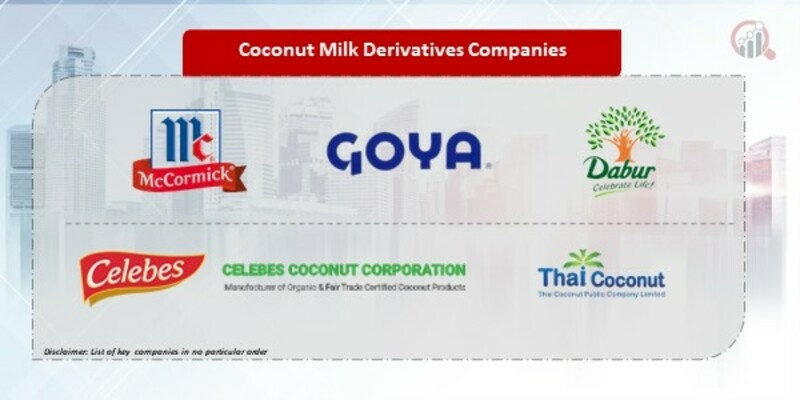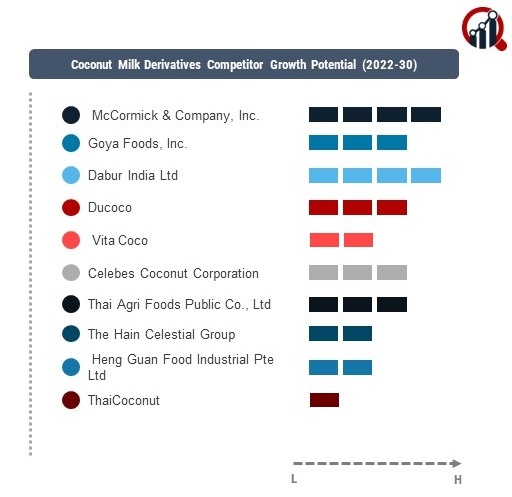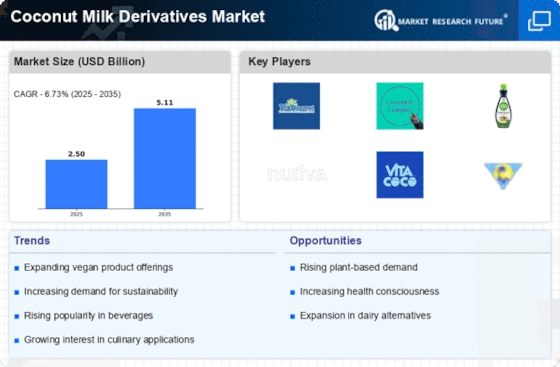Top Industry Leaders in the Coconut Milk Derivatives Market
 The Competitive Landscape of the Coconut Milk Derivatives Market is shaped by a mix of established industry leaders and emerging players, all contributing to the increasing demand for coconut-based products across various sectors. As of 2023, key players in the market have strategically positioned themselves to cater to the growing consumer preference for plant-based and dairy alternatives.
The Competitive Landscape of the Coconut Milk Derivatives Market is shaped by a mix of established industry leaders and emerging players, all contributing to the increasing demand for coconut-based products across various sectors. As of 2023, key players in the market have strategically positioned themselves to cater to the growing consumer preference for plant-based and dairy alternatives.
Key Players:
McCormick & Company
Inc. (US)
Goya Foods
Inc. (US)
Dabur India Ltd. (India)
Ducoco (Brazil)
Vita Coco (US)
Celebes Coconut Corporation (The Philippines)
Thai Agri Foods Public Co.
Ltd. (Thailand)
The Hain Celestial Group (US)
Heng Guan Food Industrial Pte Ltd. (Singapore)
and ThaiCoconut (Thailand).
Strategies Adopted:
The Coconut Milk Derivatives Market revolve around product innovation, sustainability, and market expansion. Product innovation strategies include the development of value-added coconut milk derivatives, such as flavored variations, organic options, and convenient packaging formats. Sustainable sourcing practices, focusing on responsible and ethical coconut farming, are increasingly emphasized to align with consumer expectations for environmentally friendly products. Market expansion strategies involve entering new geographic regions and collaborating with retailers to enhance the availability and visibility of coconut milk derivatives.
Market Share Analysis:
The Coconut Milk Derivatives Market is influenced by factors such as brand recognition, product quality, pricing, and distribution efficiency. Companies with well-established brands and a reputation for producing high-quality coconut milk derivatives often enjoy a competitive advantage, as consumers gravitate toward trusted and recognized names. The quality of coconut milk derivatives, including taste, texture, and nutritional content, plays a crucial role in gaining and retaining market share. Competitive pricing strategies that balance affordability with perceived quality are essential for attracting a broad customer base. Efficient distribution networks and partnerships with supermarkets, grocery chains, and specialty stores contribute significantly to a company's competitive position.
New & Emerging Companies:
The Coconut Milk Derivatives Market contribute to the competitive landscape by exploring innovative formulations, niche applications, and sustainable practices. Start-ups such as Rebel Kitchen and Rude Health have entered the market, focusing on organic and plant-based alternatives, catering to the preferences of health-conscious and environmentally aware consumers. While these companies may initially have smaller market shares compared to industry giants, their emphasis on clean labels, transparency, and sustainable sourcing adds diversity and appeal to the market.
Industry Trends:
Industry trends provide insights into ongoing developments within the Coconut Milk Derivatives Market. A notable trend in 2023 is the increased focus on clean labeling and transparency. Key players are investing in communicating the sourcing and processing methods of their coconut milk derivatives to build trust with consumers seeking natural and wholesome products. Additionally, investments in marketing campaigns highlighting the versatility of coconut milk derivatives, including their use in cooking, baking, and beverages, reflect the industry's commitment to expanding consumer awareness and usage occasions.
Competitive Scenario:
The Coconut Milk Derivatives Market remains dynamic, with companies adopting diverse strategies to gain a competitive edge. There is a notable emphasis on digital marketing and e-commerce, with companies leveraging online platforms to reach consumers directly and provide information about their coconut milk derivative products. Additionally, companies are exploring opportunities for collaborations with food bloggers, chefs, and influencers to enhance brand visibility and access niche markets.
Recent Development
The Coconut Milk Derivatives Market is the growing interest in innovative coconut-based products beyond traditional coconut milk. Key players are expanding their product portfolios to include coconut cream, coconut yogurt, and other coconut-based alternatives, capitalizing on the trend of plant-based eating. This development underscores the industry's responsiveness to evolving consumer preferences and the recognition of coconut as a versatile and nutritious ingredient.

- Beta
Beta feature










